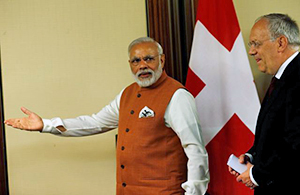Geneva, Jun 6: Switzerland today assured India of stepped up cooperation in its hunt for unearthing black money stashed by Indians in Swiss banks as it agreed to send a top official to New Delhi to extensively deliberate on the issue.
Prime Minister Narendra Modi, in his talks with Swiss President Johann Schneider-Amman, raised the issue of black money and tax evasion by Indians to which the latter offered to extend the level of cooperation.
Schneider-Amman said his government will send a state secretary for international financial matters to India on June 14 to explore enhancing cooperation on the issue.
The move is seen significant as brining back black money from foreign shores was a major electoral promise of Modi in the run up to the Lok Sabha polls in 2014.
"Combating the menace of black money and tax evasion is also our shared priority. We discussed the need for an early and expeditious exchange of information to bring to justice the tax offenders.
"An early start to negotiations on the Agreement on Automatic Exchange of Information would be important in this respect," Modi, who arrived here this morning on a short trip, said at a joint media interaction with Schneider-Amman.
On his part, the Swiss President said India and Switzerland were making "considerable progress" in fighting tax fraud and evasion.
"The delegations also discussed financial policy matters. Switzerland and India stressed their shared resolve to take action against tax fraud and tax avoidance and underlined the high quality of their cooperation in this area," the Swiss government said in a press statement.
Swiss banks, known for their banking secrecy practices, have come under global pressure as countries, including India, are stepping up efforts to crack down on the black money menace.
As part of its bilateral treaty for administrative assistance and exchange of information with Switzerland, India has sought details about numerous individuals and companies from the Alpine nation as part of its crackdown against those stashing black money in Swiss banks.
Indian tax authorities are probing a number of cases of tax evasion and black money stashed abroad. The probe had gained momentum after a leaked list of hundreds of Indian clients of HSBC's Geneva branch found its way to the Indian tax authorities.
Last month, Finance Minister Arun Jaitley had said India had signed an agreement with Switzerland and received details of those people having accounts in HSBC."We completed assessment of those people who had accounts in HSBC, Switzerland. We assessed Rs 6,000 crore black money which was in HSBC. We filed criminal cases against them," he had said.
India is keen on an automatic exchange of information about individuals who fail to disclose their foreign assets to discourage stashing of ill-gotten wealth abroad.





Comments
Add new comment